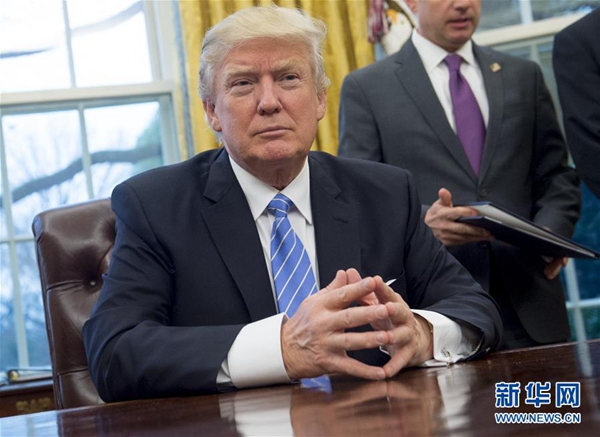The curious tradition of blaming foreign intelligence
- By Sumantra Maitra
 0 Comment(s)
0 Comment(s) Print
Print E-mail China.org.cn, July 24, 2017
E-mail China.org.cn, July 24, 2017
|
|
|
U.S. President Donald Trump [Xinhua] |
Not a day goes by that one cannot find an article blaming some hidden dark forces behind unsubstantiated allegations of hacking and collusion in the U.S. electoral system, by some shadowy foreign entity.
The latest occurrence was of course in Foreign Policy, which talked darkly of Russian hackers hacking some state department official’s emails. The tone is familiar. An unnamed official complained that he or she has been hacked. No name or further corroboration was given, for "official secrecy." The department itself didn’t confirm or deny anything. It is essentially a journalist telling us a story, without any evidence.
This isn’t new. In fact it has been a pattern of the anti-espionage hysteria since Trump won. Note, I am saying anti-espionage hysteria, and not anti-Russian, as it is not only tied up to Russia. Chinese academics are not allowed into space sectors, because apparently all Chinese residents are "agents." For any normal rational individual, the questions that would come to mind are these:
Who leaks these stories to the media and to what purpose? Why is there never any evidence presented and should we just believe the words of the intelligence agencies as words of God – especially when their record of predictions and analysis gave us the Iraq war, Libya and Syrian chemical weapons?
For anyone studying intelligence operations, it is obvious that foreign influence doesn’t work like that. There is literally no evidence as to whom the hackers may be receiving their orders from, wherever they may be based. Then comes the question that if they are indeed under orders, whether those who are giving the orders are rogue elements within Russian intel, or is it an official operation. Similarly the questions may arise if there are rogue elements within American intelligence which are "resisting" against a perceived détente with Russia.
Questions remain. For all the news reports and the hysteria, there are three questions which were never answered properly. First, how much Russian interference was there in the U.S. election cycle? All we know is of a joint report by the intelligence services presented to a select few people in the U.S. Senate, the content of which is still hidden from public or even the media.
In essence it is purely a report based on conjecture and analysis of the intelligence of the United States. No evidence is presented in any form, whatsoever to anyone, where an independent verification could be done of the contents. Compare this to the situation when Russian intel caught Victoria Nuland talking of a Ukrainian putsch. The next day, all of it was out in the open having been leaked by the media. If indeed Russian top policy makers are involved in this operation against the United States, why is that not out in the public "leaked to the media?"
Much has been made of Donald Trump’s son meeting Russian businessmen and lobbyists. Hillary Clinton’s team also met Ukrainian government officials to dig dirt on Trump. In fact the British former spy Chris Steele was himself contacted by Clinton’s team for that purpose. The U.S. is the only country which allows public lobbying before elections, and it’s baffling that no one realized foreign governments would take advantage of the system. Not to mention, historically U.S. lobbyists and firms "helped" foreign politicians, including those of East Europe and even Yeltsin. This is all a circle.
The point is this. There is without doubt foreign influence in elections. This has been the case historically. The entire Cold War was riddled with such, including in the most famous case, Soviet funding of anti-nuclear NGOs in the 80s. But nonetheless, the effect of such had been negligible. Even in this election, there is no tangible evidence that the vote count changed due to Russian influence.
Unfortunately, this is all hogwash. The reason why Trump won, or why Brexit happened is economic and social. The Anglo-Saxon world is riddled with the internal contradictions of the neo-liberal economic system, which on one hand has invited millions of foreigners, and on the other hand, impoverished the domestic working class.
There’s a curious article in the Financial Times, about a statue of Engels being relocated from Ukraine to Manchester, where Engels first started to document post-Industrial Britain. It is a symbolic act of our times, and unless the major Western problems of economic inequality and mass migration from the Middle East and Africa in return of endless foreign intervention are stopped, no amount of hysteria about foreign interference will solve the structural rot of the system.
Those living in the bubbles of media and academia, believing everything that comes out of their state intelligence apparatus without any skepticism, should rather go out and talk to common people in their own countryside.
Sumantra Maitra is a columnist with China.org.cn. For more information please visit:
http://www.china.org.cn/opinion/SumantraMaitra.htm
Opinion articles reflect the views of their authors only, not necessarily those of China.org.cn.







Go to Forum >>0 Comment(s)